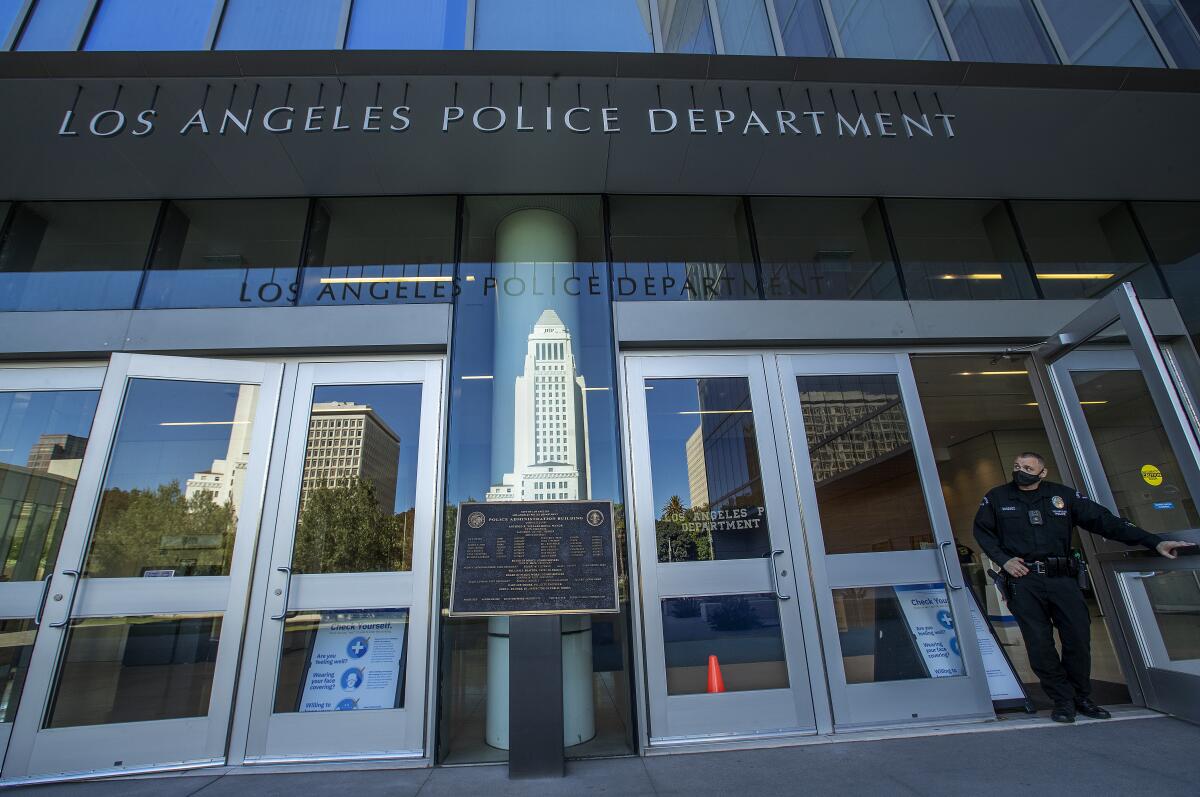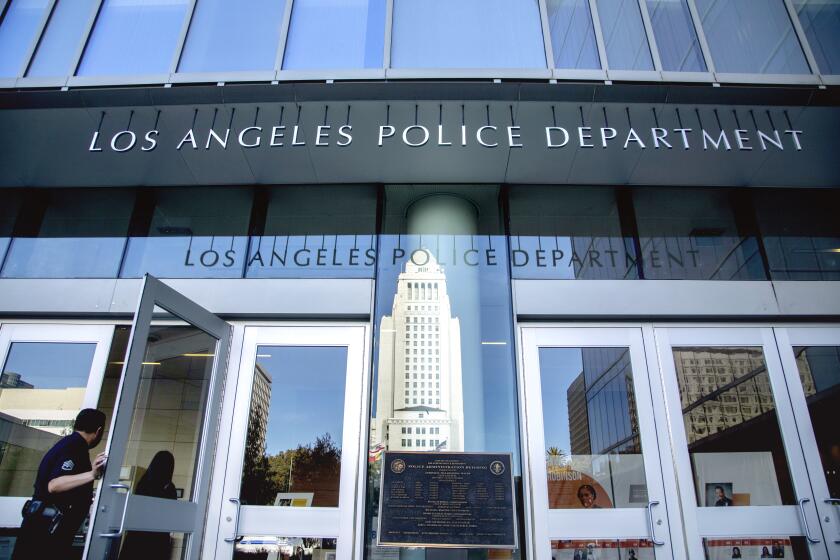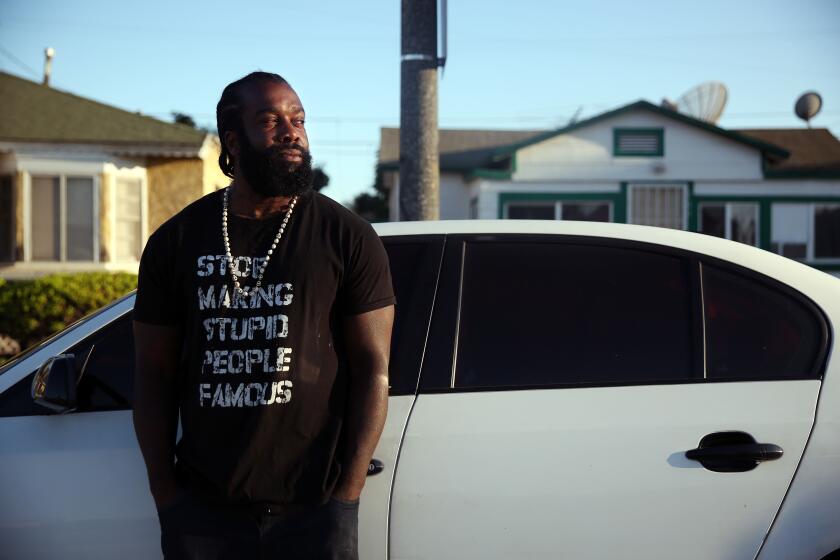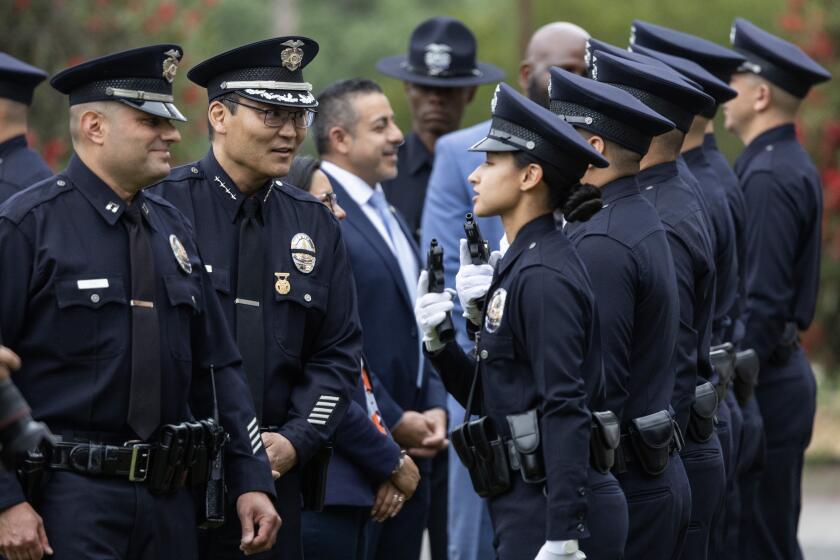L.A. wants to make firing bad cops easier. Should the LAPD’s watchdog have a role?

- Share via
The Los Angeles Police Department’s much-maligned disciplinary system is on the verge of a major transformation, and members of the L.A. Police Commission expressed concern Tuesday about being left out of the discussion.
The five-member commission, appointed by the mayor to provide civilian oversight of the department, was responding to a City Council proposal that could give the LAPD chief the power to fire cops outright for suspected misconduct and reform a process that critics say has seriously undermined accountability efforts.
The City Council’s tentative plan, which would require approval from Los Angeles voters in November, focuses on disciplinary panels comprising only civilians, which review the cases of officers accused of misconduct and decide whether they should be fired or face punishment.
The proposed reforms would do away with all-civilian panels, adding a sworn member of the department as one of the three representatives.
A split composition was once standard. However, since 2019, officers have been able to choose which type of panel they will face, and the all-civilian route has proved more lenient.
Department officials previously said that of the 27 hearings held last year for officers whom the chief wanted to fire, all-civilian panels gave the accused lighter discipline in 11 cases.
At Tuesday’s meeting, Commissioner Rasha Gerges Shields said she wished for more of an opportunity to weigh in on disciplinary changes.
Even in seemingly clear-cut cases of serious misconduct, the LAPD’s disciplinary system has led to outcomes in which those involved keep their jobs and continue collecting paychecks. Now, some leaders are renewing calls for a radical overhaul.
Shields said city leaders should think twice about a controversial element of one of the two proposals considered by the council, which calls for the use of binding arbitration to resolve disciplinary cases. Research from across the country — summarized in a report by the city’s chief legislative analyst — shows that such an approach tends to favor employees in disciplinary matters.
Commissioner William Briggs asked rhetorically why the City Council couldn’t just repeal the 2017 ballot measure known as Charter Amendment C, which created the system of all-civilian disciplinary panels, without seeking a popular vote.
“Why they’re kicking this proverbial can down the street, I don’t know,” he said.
At the start of the meeting, Briggs announced that Tuesday would be his last day in the volunteer position. The entertainment lawyer and Maria “Lou” Calanche are the longest-tenured commissioners, the only remaining appointees of former Mayor Eric Garcetti.
“It’s unfortunate that the commission couldn’t weigh in on these discussions. There’s a lot that we deal with that could’ve provided insight,” Calanche said.
Interim Chief Dominic Choi said the Los Angeles Police Protective League, the union for the LAPD’s rank and file, has signaled its support for binding arbitration and allowing the chief the authority to fire officers outright for misconduct.
The Police Protective League has not responded to numerous messages seeking comment about the council action.
A plan backed by City Councilmember Monica Rodriguez, who chairs the powerful public safety committee, was approved in a split vote at a committee meeting a few weeks ago. It would require disciplinary panels to have two civilians and one police official. The police union first pitched that makeup in the late 1990s.
The city attorney’s office is drawing up final language for the reform proposal, which is expected to be up for a full council vote in the next few weeks, clearing a path for putting the matter on the November ballot.
Department officials say all-civilian panels have allowed cops accused of wrongdoing to remain on the force despite the chief calling for their termination.
Los Angeles is one of the only cities in the state where officers accused of serious misconduct are entitled to an administrative hearing before they can be fired, officials have said.
Wednesday’s vote was the latest development in a yearslong push to overhaul traffic policing.
Proponents say adding a sworn officer to the panels will lend the perspective of someone who has done the job and thus understands the implications of allowing officers who have lied or stolen to continue working.
The reform proposal also allows for the outright firing of officers for serious misconduct — including using excessive force, racial bias and dishonesty — that could result in them being stripped of their license to carry a badge. Officers could appeal their punishment to an arbitrator.
Under the city’s charter, LAPD disciplinary hearings play out like mini-trials, with evidence and witnesses. The proceedings are secret, and critics say the department’s history is littered with cases of problem officers who’ve kept their jobs and continued collecting paychecks despite evidence of misconduct that undermines their credibility and precludes them from doing even basic police work.
LAPD officials estimate that there are nearly 70 such officers currently on the payroll.
Some opponents of the City Council’s proposed measure say they are wary of concentrating too much power in the chief’s hands, which could open the door to abuses of the discipline system to punish officers who’ve fallen out of favor or to settle old scores.
Critics of the reform effort have said the department is bringing cases against officers based on circumstantial evidence, and civilian panels are less likely than officers to fear running afoul of top brass.
A popular vote in 1992 after the Rodney King beating created LAPD disciplinary panels with two officers and one civilian. LAPD watchdogs pitched it as a reform, but years of research have since shown that civilians tend to be more supportive of police, leading to questions about whether the people chosen for the panels adequately represent the public’s interests.
Some panelists, known as hearing examiners, have complained that they haven’t been picked to hear cases based on their perceived views about policing.
Councilmembers Hugo Soto-Martinez and Tim McOsker forged an unlikely alliance last year in calling to scale back the involvement of civilians.
As the Police Commission continues its citywide listening tour to hear about what residents want to see in the department’s next leader, many of the stops have seen a low turnout.
But Soto-Martinez pushed back against a version of the plan that emerged from the public safety committee, saying he disagreed with locking the department into any specific configuration. He worried that there were no data on the effectiveness of panels with two civilians and one officer.
Like Shields of the Police Commission, he questioned the use of binding arbitration for officers who appeal their terminations or suspensions, pointing to studies and testimony from city and police leaders nationwide that show the outcomes usually favor law enforcement.
McOsker acknowledged concerns raised by officers for years that the disciplinary system is skewed in favor of the department, so switching the makeup of panels may not work either.
“The way to avoid a lenient system isn’t to reintroduce a biased system,” McOsker said.
More to Read
Sign up for Essential California
The most important California stories and recommendations in your inbox every morning.
You may occasionally receive promotional content from the Los Angeles Times.














